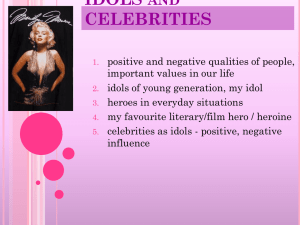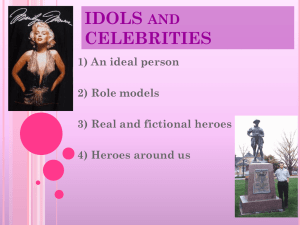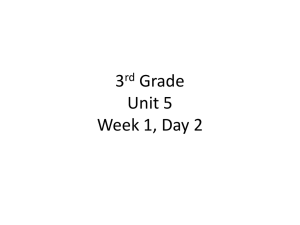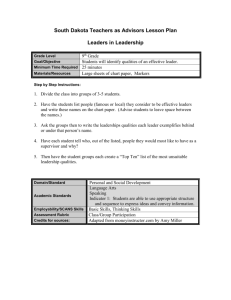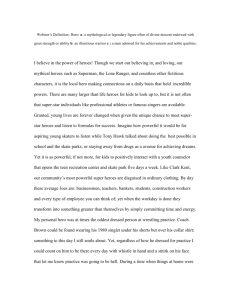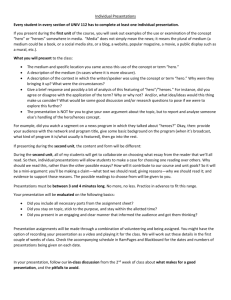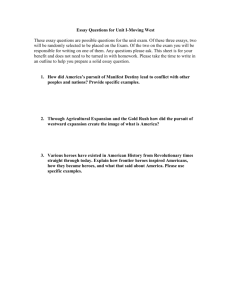23 Examples and Ideals
advertisement
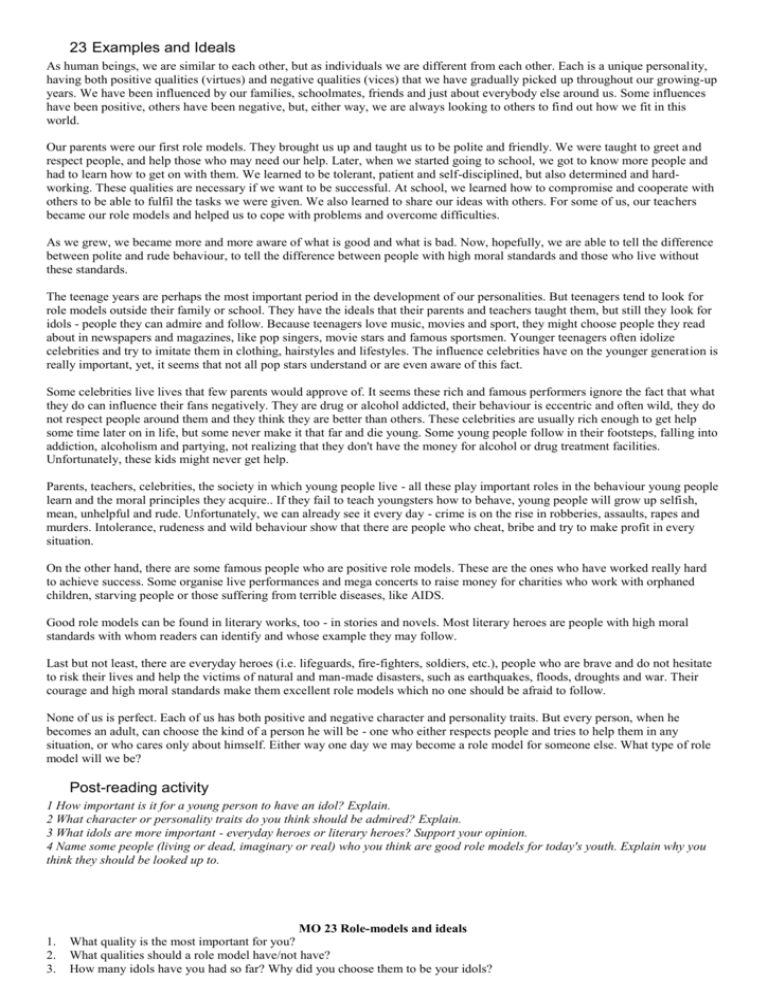
23 Examples and Ideals As human beings, we are similar to each other, but as individuals we are different from each other. Each is a unique personality, having both positive qualities (virtues) and negative qualities (vices) that we have gradually picked up throughout our growing-up years. We have been influenced by our families, schoolmates, friends and just about everybody else around us. Some influences have been positive, others have been negative, but, either way, we are always looking to others to find out how we fit in this world. Our parents were our first role models. They brought us up and taught us to be polite and friendly. We were taught to greet and respect people, and help those who may need our help. Later, when we started going to school, we got to know more people and had to learn how to get on with them. We learned to be tolerant, patient and self-disciplined, but also determined and hardworking. These qualities are necessary if we want to be successful. At school, we learned how to compromise and cooperate with others to be able to fulfil the tasks we were given. We also learned to share our ideas with others. For some of us, our teachers became our role models and helped us to cope with problems and overcome difficulties. As we grew, we became more and more aware of what is good and what is bad. Now, hopefully, we are able to tell the difference between polite and rude behaviour, to tell the difference between people with high moral standards and those who live without these standards. The teenage years are perhaps the most important period in the development of our personalities. But teenagers tend to look for role models outside their family or school. They have the ideals that their parents and teachers taught them, but still they look for idols - people they can admire and follow. Because teenagers love music, movies and sport, they might choose people they read about in newspapers and magazines, like pop singers, movie stars and famous sportsmen. Younger teenagers often idolize celebrities and try to imitate them in clothing, hairstyles and lifestyles. The influence celebrities have on the younger generation is really important, yet, it seems that not all pop stars understand or are even aware of this fact. Some celebrities live lives that few parents would approve of. It seems these rich and famous performers ignore the fact that what they do can influence their fans negatively. They are drug or alcohol addicted, their behaviour is eccentric and often wild, they do not respect people around them and they think they are better than others. These celebrities are usually rich enough to get help some time later on in life, but some never make it that far and die young. Some young people follow in their footsteps, falling into addiction, alcoholism and partying, not realizing that they don't have the money for alcohol or drug treatment facilities. Unfortunately, these kids might never get help. Parents, teachers, celebrities, the society in which young people live - all these play important roles in the behaviour young people learn and the moral principles they acquire.. If they fail to teach youngsters how to behave, young people will grow up selfish, mean, unhelpful and rude. Unfortunately, we can already see it every day - crime is on the rise in robberies, assaults, rapes and murders. Intolerance, rudeness and wild behaviour show that there are people who cheat, bribe and try to make profit in every situation. On the other hand, there are some famous people who are positive role models. These are the ones who have worked really hard to achieve success. Some organise live performances and mega concerts to raise money for charities who work with orphaned children, starving people or those suffering from terrible diseases, like AIDS. Good role models can be found in literary works, too - in stories and novels. Most literary heroes are people with high moral standards with whom readers can identify and whose example they may follow. Last but not least, there are everyday heroes (i.e. lifeguards, fire-fighters, soldiers, etc.), people who are brave and do not hesitate to risk their lives and help the victims of natural and man-made disasters, such as earthquakes, floods, droughts and war. Their courage and high moral standards make them excellent role models which no one should be afraid to follow. None of us is perfect. Each of us has both positive and negative character and personality traits. But every person, when he becomes an adult, can choose the kind of a person he will be - one who either respects people and tries to help them in any situation, or who cares only about himself. Either way one day we may become a role model for someone else. What type of role model will we be? Post-reading activity 1 How important is it for a young person to have an idol? Explain. 2 What character or personality traits do you think should be admired? Explain. 3 What idols are more important - everyday heroes or literary heroes? Support your opinion. 4 Name some people (living or dead, imaginary or real) who you think are good role models for today's youth. Explain why you think they should be looked up to. 1. 2. 3. MO 23 Role-models and ideals What quality is the most important for you? What qualities should a role model have/not have? How many idols have you had so far? Why did you choose them to be your idols? 4. 5. 6. 7. 8. 9. 10. 11. 12. 13. 14. 15. 16. Who is your present idol? What do you admire about him/her? Is it important for people to have a person which they admire? Why? Do you think that the famous people should be role models? Why? What is your opinion on the competition “Slovensko hľadá Superstar competition.” Do you think that some of the singers in this competition are the role models for young people? Who is your favourite literary or film hero? Why? Would you like to be a role model for somebody? If so, what qualities you should be admired for? Explain why. If you got a chance to spend one day with your idol, where would you go; what would you do and what would you tell him/her? Are you aware of your bad habits? Can you name some of them? Do you do anything to get rid of them? What do you think of this statement: “Be yourself no matter what they say.” Do we have any Slovak heroes? What do you know about them? Tell us about some personalities famous all over the world. Which human qualities do you appreciate and which ones do you consider negative. In which situations may people become heroes? Have you ever been a hero for someone? MO 23 Role-models and ideals (Project Outline) ¶1Positive and negative qualities, an ideal human Are all the people the same? What positive qualities (virtues) do people have? What negative qualities (vices) do people have? ¶2 Role models and ideals, Idols Define the terms “ role model, ideal” and “idol” Is it important for young people to have a role model? Why/why not? Who influences us during our life? (Our parents, siblings, relatives, our friends, teachers, famous people and celebrities, sportsmen, politicians etc.) ¶3 Our parents How do our parents influence us? Why are they important in the process of our growing up? What do they teach us to do? What qualities do they help us to achieve? ¶4 Our friends Why are our friends important for each person? Is it easy to choose a friend? Why? Why not? What are the qualities of a good friend? ¶5 Teachers Why are teachers so important for young people? What qualities should they teach young people? What is a good teacher like? ¶6 Celebrities What kinds of people belong to celebrities? How do the celebrities influence young people? Give the famous people who have a positive influence on young people. What is positive about them? What celebrities have negative influence on teenagers? Give examples of their unsuitable behaviour. ¶7 Literary heroes, film heroes Where can literary and film heroes be found? Give some examples of a literary hero. Why is he/she a hero to young people? Give some examples of a film hero. Why is he/she a hero to young people? ¶8 Everyday heroes Who are the typical everyday heroes? Where can they be found? What do these heroes do that makes them heroes? ¶9 My qualities What are your good and bad qualities? What positive qualities would you like to have? Which of your negative qualities do you want to eliminate/get rid of? ¶10 My role models, ideals, heroes What people influence you now or have ever influenced you during your life? Who has the biggest influence on you? In which way does he/she influence you? What are your role models? Describe them. Do you like some celebrities? Have you got any music or film idols? What literary heroes do you like? Describe them. What everyday heroes do you admire? What do you like about them? Would you like to do their job? Would you like to be a hero? Talk about your reasons.
